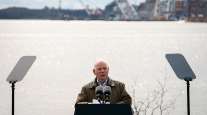Senior Reporter
‘Everything’s on the Table’ to Fund Infrastructure, Says Rep. Sam Graves
WASHINGTON — The chairman of the surface transportation subcommittee in the House said Congress will need to consider ways other than raising taxes on fuel to fund infrastructure projects.
“So we’ve got to look at some options, and everything’s on the table,” Rep. Sam Graves (R-Mo.) told an audience May 16 at an event hosted by the Eno Center for Transportation and the American Association of State Highway and Transportation Officials.
The event was part of the first day of the ongoing advocacy campaign billed as Infrastructure Week. Graves is chairman of the Highways and Transit Subcommittee.
INFRASTRUCTURE WEEK COVERAGE: Via TT's Capitol Agenda
“The gas tax is a repressive way of doing this because we got cars on the road that are much more efficient than they were years before and then we also have cars that simply aren’t paying any gas tax — alternative fuel cars,” Graves explained.
The alternatives to raising fuel taxes would include expanding tolling on highways, a tax on tires and relying on a vehicle miles traveled fee, Graves said, adding that the five-year FAST Act highway law enacted in December fell short of achieving a long-term funding fix for infrastructure.
In the FAST Act, federal lawmakers stitched together intricate funding formulas using money from other parts of the federal apparatus to pay for transportation that are “quite temporary,” Graves said.
“A lot of it doesn’t have anything to do with transportation,” he said.
A significant source of the FAST Act’s funding came from liquidating a portion of the Federal Reserve surplus and selling units from the country’s Strategic Petroleum Reserve.
Congress opted not to raise taxes on diesel and gas to back the FAST Act’s programs, despite calls to do so from transportation stakeholders such as the trucking industry. Advances in fuel efficiency and a rejection of traditional driving habits by millennials contributed to the transportation funding shortfall.




